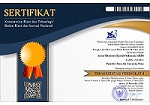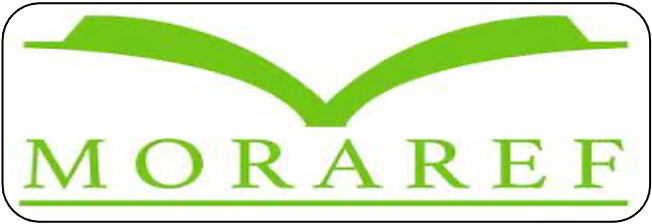Analisa Penerapan Prinsip Syariah dalam Asuransi
Abstract
In recent years, we have heard and seen many economic activities based on Islamic law or Sharia law. These activities are related to the production process in the service industry. So it appears Sharia Business Unit (UUS), such as Islamic Banking, Sharia Insurance, Sharia Pawnshops, Sharia Leasing, even up to syariah tourism. This is certainly very reasonable, because the rationality and social level of human life undergo many changes, from the level of social and economic life that has freedom, to a new economic level that requires religious values. The Islamic economic system has different characteristics from conventional economics. Islamic economics is a fair and thorough system and seeks to ensure that wealth is not collected only to one group, but spread throughout society. (Afzalur Rahman, 1996: 11). One of Sharia financial institutions that can apply the sharia principles is Sharia Insurance. This research will try to analyze the principles of sharia in insurance, using qualitative descriptive method that is describing the object of research by using literature study that comes from the relevant book or journal. The result of the research shows that there are 8 principles in Takaful Insurance which become the guideline of implementation, that is Tawheed (Ketaqwaan), Justice, Not Dzalim, At Tawaun (please help), Amanah, Ridha, Khitmah (good service), and free from gharar element, maisir, and usury. In practice many sharia entities have been implementing sharia principles well although there are still some shortcomings in Takaful insurance, for example in research that has been done by Erza Armas hardi, 2015 obtained the result that Takaful insurance has not touched the bottom of society group (grass root).
Keywords : Sharia Insurance, Sharia Principles, Sharia Entity, Tabarru
Full Text:
PDFReferences
Nur Hidayati Rosidah, Asuransi Konvensional dan Asuransi Syariah : Perbedaan Dalam Lingkup Akuntansi, Universitas negeri Surabaya, Universitas Surabaya, Surabaya.
Kitab Undang-Undang Hukum Dagang, Citra Umbara, bandung, 2010
Eja Armaz Hardi, Studi Komparatif Takaful Dan Asuransi Konvensional, Jurnal Bisnis Dan Manajemen, Vol. 3 no. 2, Desember 2015.
Bappepam-LK, Laporan Tahunan 2010, Kementrian Keuangan RI, Jakarta, 2010. Bappepam-LK, Laporan Tahunan 2011, Kementrian Keuangan RI, Jakarta, 2011.
Fatwa Dewan Syariah Nasional. No. 2 1/DSN-MUI/X/2001. Tentang Pedoman Umum Asuransi Syariah.
Kaslan. A. Tohir. ”Ekonomi Modern”. Pradnya Paramita. Jakarta. 1975.
Nurul Huda dan M. Haykal. Lembaga Keuangan Islam: Tinjauan Teoritis dan Praktis. h. 2010.
Sri Wahyuni, Asep Ramdan Hidayat, Neneng Nurhasanah, Analisa Pelaksanaan prinsip Asuransi Syariah Terhadap Pelaksanaan Perjanjian Asuransi jiwa Di PT. Asuransi Takaful Keluarga Cabang Bandung, Keuangan dan Perbankan Syariah, Fakultas Syariah, Universitas Islam Bandung,
Undang – undang no. 2 Tahun 1992 tentang usaha perasuransian.
Kasmir. Bank dan Lembaga Keuangan Lainnya. Rajawali Pers. Jakarta. Ed Revisi. 2014.
Muhammad Syakir Sula, Asuransi Syariah: Life and general: Konsep dan Sistem Operasional, Gema Insani Press, Jakarta, 2004, cet-1.
Muhamad Thoin, Anik, Aspek-Aspek Syariah Dalam Asuransi Syariah, Jurnal Ekonomi Islam Vol. 1, No. 1, Maret 2015, STIE AAS Surakarta.
Muhaimin Iqbal, Asuransi Umum Syariah Dalam Praktik (Upaya menghilangkan Gharar, Maisir, Riba), Gema Insani Pres, Jakarta, 2005.
AM. Hasan Ali, Asuransi Dalam Perspektif hukum Islam, Jakarta, Prenada Media, 2004
Tazkiah Ashfia, Sihabudin, Prayudo Eri Yandono , Analisis Pengaturan Akad Tabarru’ dan Akad Tijarah Pada Asuransi Syariah Menurut Fatwa DSN Nomor 21/DSN-MUI/X/2001 Tentang Pedoman Umum Asuransi Syariah, Universitas Brawijaya, malang.
Kasmir. Bank dan Lembaga Keuangan Lainnya. Rajawali Pers. Jakarta. Ed Revisi. 2014.
Yadi jawari, Asuransi Syariah, Pustaka Bani Quraiy, Bandung, 2005.
Anwar, Khoiril.. Asuransi Syariah, Halal dan Maslahat. Solo: Penerbit Tiga
Serangkai, 2007
DOI: http://dx.doi.org/10.21927/jesi.2017.7(2).128-137












